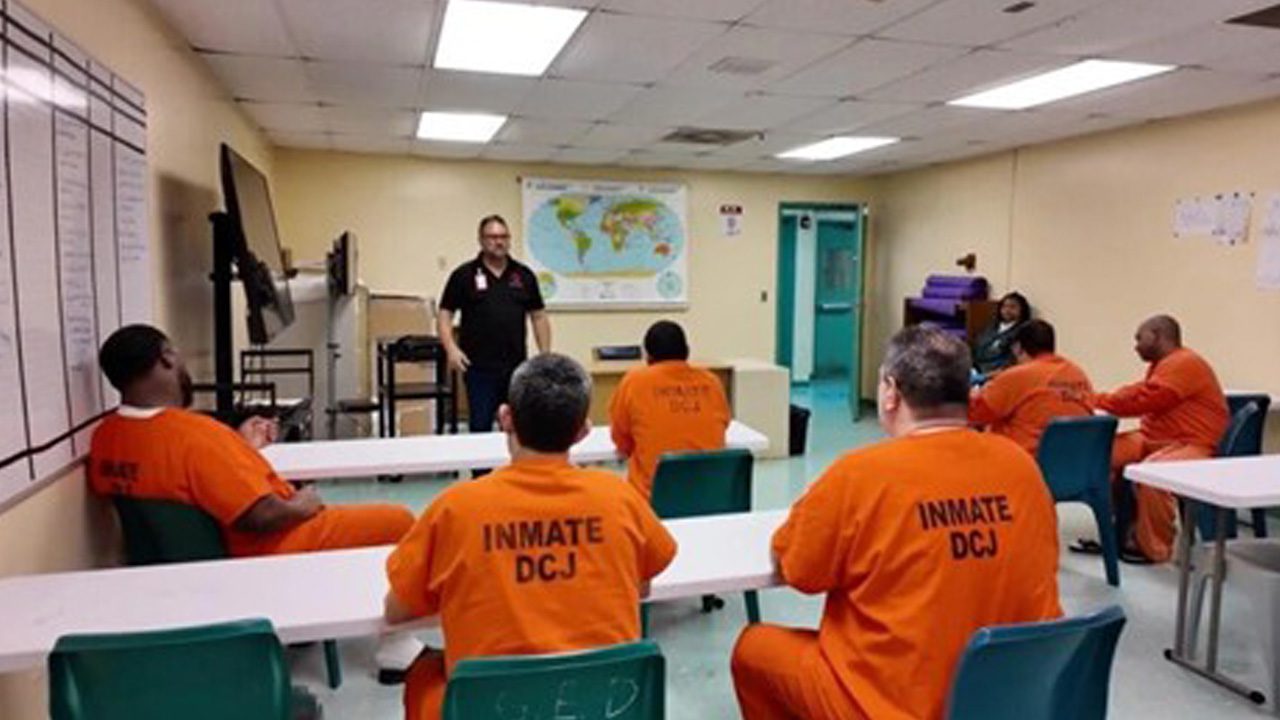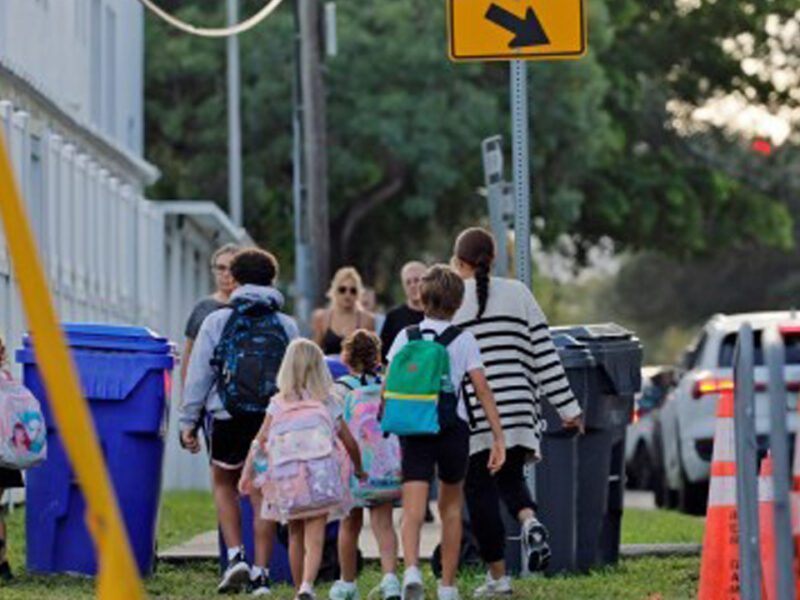Prison to classroom: Miami-Dade invests in inmate education program
WLRN | By Amelia Orjuela Da Silva | December 12, 2024
In a move that strengthens Miami-Dade County’s commitment to criminal justice reform and workforce development, the Board of County Commissioners has approved a renewed affiliation agreement between Miami-Dade County Public Schools (MDCPS) and the Miami-Dade County Department of Corrections and Rehabilitation (MDCR) for an inmate education program.
Sponsored by District 12 Commissioner Juan Carlos Bermudez at a recent meeting, the resolution will provide continued academic and vocational education to inmates at multiple correctional facilities throughout Miami-Dade County.
The agreement, approved for the 2024-2025 and 2025-2026 school years, authorizes up to $400,000 per year to fund education programs to reduce recidivism and aid the successful reintegration of former inmates into society. The resolution ensures inmates receive adult basic education (ABE), General Equivalency Diploma (GED) preparation, and career-technical training.
A long-standing impact
Lindsey Hopkins Technical College, an MDCPS division, has offered educational services to incarcerated individuals since the late 1980s. The program has grown to serve both adult and juvenile inmates in various facilities, including the Turner Guilford Knight Correctional Center (TGK), Metro West Detention Center, Miami-Dade County Pre-Trial Detention Center, and the Boot Camp program.
Bermudez, who sponsored the renewed agreement, emphasized the importance of education in reshaping lives.
“Providing these opportunities allows individuals to envision a different future for themselves and thus lead to a better society for all,” he said.
Education has long been seen as a critical tool in reducing recidivism. Studies have shown that prison education reduces recidivism rates by over 40%, benefiting not just the individuals who receive education but society as a whole. Additionally, the economic benefits are substantial: every $1 invested in prison education can reduce incarceration costs by up to $5 in the first three years after an inmate is released.
Adult Basic Education programs
The current program includes adult basic education (ABE), preparing inmates for the GED test. Compared with 18% of the general population, approximately 41% of incarcerated individuals do not hold a high school diploma. These programs are designed to help individuals reenter society with the skills and qualifications necessary to pursue a career or job after being released.
Chantal G. Osborne, the director at Lindsey Hopkins Technical College, explained that the primary focus of the curriculum is to provide academic support.
“Our goal is to really go into these facilities, assess where each inmate is academically, and prepare these inmates with whatever they need,” Osborne said. “Every student there is not going to be on the same level, so we have to come to the point of really looking at each individual and seeing where they lie.”
The program includes reading, math, science, and social studies courses, all aimed at preparing inmates to pass the GED exam.
In addition to traditional classroom instruction, Osborne also highlighted the Miami-Dade Boot Camp program. This 16-month court-offered diversion program utilizes an Inmate Management System known as “Shock Incarceration” and “Regimented Inmate Discipline.” It functions in a paramilitary environment and includes academic, vocational, and rehabilitative programs, financial literacy, skills training, job placement, volunteer opportunities, and the “Thinking for a Change” model. The program also features structured activities and a wide range of services.

Chantal G. Osborne, director at Lindsey Hopkins Technical College, said that the primary focus of their curriculum is to provide academic support.
Boot Camp Program participants are convicted offenders aged between 14 and 24. Those who are under 18 have been adjudicated as adults and are required to participate in the program as part of their sentence. Inmates must complete an educational component, such as obtaining a GED.
For Osborne, it is not just a detention facility, but a place focused on rehabilitation, academic advancement and personal growth. She explained how the program provides both educational opportunities and emotional support.
“Boot Camp is very special because it involves a graduation ceremony, and they have some sort of family nights for the parents,” she said. “It’s a rehabilitative process that helps them think differently about their future.”
The Boot Camp Program has resulted in a consistently low recidivism rate for its graduates, currently at 11%.
Any opportunity for these inmates to learn will certainly help them when they reintegrate back into school or society,” Bermudez said. “These courses will help them to be ready for new and better opportunities.”
Enrollment in the program is facilitated directly through the Miami-Dade Corrections and Rehabilitation Department. Osborne explained that the facilities provide a list of inmates eligible to take part in the courses, and teachers are stationed there to deliver instruction both in the morning and evening.
“We work closely with the facilities to determine which inmates will participate, and we have agreements with them to ensure the process runs smoothly,” she said.
The Miami Times contacted the Miami-Dade Correction and Rehabilitation Department for comment, but it did not respond by the time of this publication.
While vocational programs like environmental services are not currently offered, they will be implemented again soon. Osborne emphasized that the focus remains on preparing inmates for the GED test.
“Right now, we’re concentrating on adult basic education because getting a GED is the first step in being successful in society,” Osborne explained. “Once they have the GED, we can start looking at career pathways, but education is the foundation.”
The length of the program varies, depending on the individual’s sentence and academic progress. In facilities like Boot Camp, inmates are given a set period to complete their educational component, which includes the GED. In contrast, the more transient nature of pretrial detention means that inmates may have shorter periods to complete the program. However, Osborne noted that Lindsey Hopkins does its best to accommodate and support each inmate’s educational journey.
Beyond the bars
The renewed partnership between Miami-Dade County and Lindsey Hopkins is an essential part of the broader effort to reduce recidivism and prepare incarcerated individuals for reintegration into the workforce and society.
“Everyone deserves a second chance,” Osborne emphasized. By providing educational services, Lindsey Hopkins helps inmates build the skills they need to break the cycle of incarceration and open its doors once they return to society to understand the process of pursuing a career.
“As a director, I stand on every student really having a second chance, and second chances are what you need in order to be successful,” Osborne said “Especially for an inmate that’s incarcerated and can be able to walk out with the GED in their hand to then to start into the workforce with that piece of paper is a win-win for both.”
Programs outside the correctional education at Lindsey Hopkins include career and technical programs in any of the following areas: Commercial Arts & 3D Animation, Commercial Foods, Culinary Arts & Baking, Construction, Health Occupations, Information Technology, Licensed Childcare, Manufacturing, Personal Services, and Transportation.
In addition to the educational programs, Miami-Dade County partners with Transition Miami, a non-profit reentry service provider that assists returning citizens with job search, placement, job training, and certifications in various trades.






